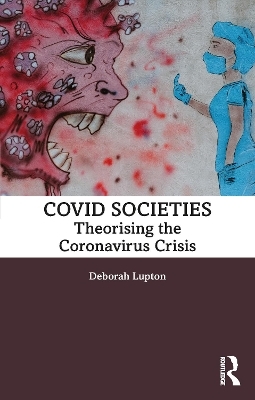
COVID Societies
Routledge (Verlag)
978-1-032-06056-9 (ISBN)
COVID Societies presents a compelling and accessible overview of key sociocultural theories that can help us make sense of the diverse, dynamic and complex elements of the COVID crisis. These include discussions of the political economy perspective; biopolitics; risk society and cultures; gender and queer theory; and more-than-human theory. The book provides insights into everyday life around the world as people battled with containing the pandemic and explores the broader historical, social, cultural and political contexts in which these responses have developed.
COVID-19 is the most serious pandemic to affect the world in the past century. We have all lived in ‘COVID societies’, the long-term effects of which have yet to be experienced or imagined. The COVID crisis has affected countries, regions within countries and social groups within regions in strikingly different ways. These impacts are continually changing, just as the novel coronavirus has mutated into different strains and variants. Throughout the book, a series of intertwined threads cross back and forth between the macropolitical and micropolitical dimensions of COVID-19: contagion, death, risk, uncertainty, fear, social inequalities, stigma, blame and power relations. Overarching these threads are five complementary themes: the historicity of COVID societies; the tension between local specificities and globalising forces; the control and management of human bodies; the boundary between Self and Other; and the continuously changing sociomaterial environments in which the world is living with and through the shocks of the COVID crisis.
This book will be of great interest to anyone seeking to understand the manifold complex sociocultural consequences of the COVID-19 pandemic.
Deborah Lupton is SHARP Professor in the Faculty of Arts, Design & Architecture, University of New South Wales (UNSW) Sydney, Australia. Her research is interdisciplinary, spanning sociology, communication and cultural studies. She is located in the Centre for Social Research in Health and the Social Policy Research Centre and leads both the Vitalities Lab and the UNSW Node of the Australian Research Council Centre of Excellence for Automated Decision-Making and Society. She is an elected Fellow of the Academy of the Social Sciences in Australia and holds an Honorary Doctor of Social Science degree awarded by the University of Copenhagen.
Introduction: COVID societies 1. COVID in context: histories and narratives of health, risk and contagion 2. The macropolitics of COVID: a political economy perspective 3. The biopolitics of COVID: Foucauldian approaches 4. Risk and COVID: risk society and risk cultures 5. Queering COVID: insights from gender and queer theory 6. More-than-human COVID worlds: sociomaterial perspectives Conclusion: reflections on COVID futures
| Erscheinungsdatum | 08.04.2022 |
|---|---|
| Zusatzinfo | 1 Tables, black and white |
| Verlagsort | London |
| Sprache | englisch |
| Maße | 138 x 216 mm |
| Gewicht | 120 g |
| Themenwelt | Studium ► 1. Studienabschnitt (Vorklinik) ► Med. Psychologie / Soziologie |
| Sozialwissenschaften ► Soziologie ► Allgemeines / Lexika | |
| ISBN-10 | 1-032-06056-5 / 1032060565 |
| ISBN-13 | 978-1-032-06056-9 / 9781032060569 |
| Zustand | Neuware |
| Informationen gemäß Produktsicherheitsverordnung (GPSR) | |
| Haben Sie eine Frage zum Produkt? |
aus dem Bereich


